|
 With Progeny,
Kat Riggins’ latest release from Gulf
Coast Records, the talented Miami-based vocalist
pays tribute to her family and their influence
on her life and career. Her second effort for
Gulf Coast finds her working with label
founder/guitarist Mike Zito, bassist Doug Byrkit,
drummer Matthew Johnson, keyboardist Lewis
Stephens, along with special guests Melody Angel
and Albert Castiglia (guitars) and rapper Busta
Free. The 13 tracks are all Riggins originals,
running the gamut from blues to soul to rock and
gospel. With Progeny,
Kat Riggins’ latest release from Gulf
Coast Records, the talented Miami-based vocalist
pays tribute to her family and their influence
on her life and career. Her second effort for
Gulf Coast finds her working with label
founder/guitarist Mike Zito, bassist Doug Byrkit,
drummer Matthew Johnson, keyboardist Lewis
Stephens, along with special guests Melody Angel
and Albert Castiglia (guitars) and rapper Busta
Free. The 13 tracks are all Riggins originals,
running the gamut from blues to soul to rock and
gospel.
The opener, “Walk
On,” is a defiant blues rocker with layers of
crunching guitars, a funky backbeat, and a
particularly feisty vocal from Riggins. The
moody “Sinkin’ Low” takes a hard look at our
troubled world, with Riggins’ vocal taking on a
tense, ominous tone. “Espresso” is an upbeat,
catchy love song, both musically and lyrically,
and “Got To Be God” is a soulful ballad about
rebounding from a failed relationship.
Meanwhile, Riggins points out that whatever
travails she faces, she won’t be alone on the
earnest upbeat rocker “Warriors.”
“In My Blood” is
a buoyant gospel-flavored number with Riggins
celebrating her family and their heritage, and
she keeps that gospel feeling going with an
absolutely beautiful a capella reading of “Walk
With Me Lord” that will put goosebumps on your
goosebumps. The haunting “Promised Land” is a
terrific, grinding blues rocker with soaring
fretwork from Zito and a powerful vocal from
Riggins.
The singer is
joined by Castiglia on guitar and Free with rap
vocals on the funky tribute to Miami, “My City,”
and Angel plays guitar on “WoahMan,” an
energetic track encouraging women to stand up
for what they deserve.
The solemn “Cross
The Line” is another gospel-themed song, while
“Mama” is a bittersweet tribute to Riggins’ late
mother (give yours a hug if you still have her).
The album closes with “40 25:40,” another gospel
number that tells of the return of Jesus and the
coming judgment on all.
I’ve heard all of
Riggins’ releases, and while her vocals are
always strong I think Progeny features
her best vocal performances to date. Maybe it’s
her closeness to the material, but she pours
heart and soul into these songs, even more than
she has on previous efforts. Her albums are
always a pleasure to listen to, but Progeny
captures her at her very best and leaves
listeners wanting more.
--- Graham Clarke
 Australian blues
rocker Matty T. Wall’s previous three
albums have all been wildly entertaining, with
his fierce guitar work and powerful vocals
working in a variety of styles that span beyond
the blues genre into rock and even jazz
territory. It’s only appropriate that he give
his fans a taste of his live show, and he does
so with Live Down Underground (Hipsterdumpster
Records), a powerhouse set recorded at Lyric
Underground in Perth, Western Australia with
drummer Ric Whittle and bassist Leigh Miller
providing rock solid backing behind Wall’s
jaw-dropping guitar work. Australian blues
rocker Matty T. Wall’s previous three
albums have all been wildly entertaining, with
his fierce guitar work and powerful vocals
working in a variety of styles that span beyond
the blues genre into rock and even jazz
territory. It’s only appropriate that he give
his fans a taste of his live show, and he does
so with Live Down Underground (Hipsterdumpster
Records), a powerhouse set recorded at Lyric
Underground in Perth, Western Australia with
drummer Ric Whittle and bassist Leigh Miller
providing rock solid backing behind Wall’s
jaw-dropping guitar work.
The nine-song set
consists of six songs from Wall’s 2016 album,
Blue Skies, and three from 2018’s
Sidewinder. The disc opens with the
harrowing, hard-charging rocker, “Broken Heart
Tattoo.” This high-energy song is followed by
the instrumental, “Slideride,” which believe it
or not, picks up the energy level even higher.
The mid-tempo “Burnin’ Up Burnin’ Down” keeps
the momentum going into the rough-edged “Walk
Out The Door” and the appropriately titled
“Scorcher,” before the group pauses to catch
their breath on the splendid slow burner “This
Is Real.”
The album’s lone
cover is Jimi Hendrix’s “Voodoo Chile,” not the
(Slight Return) most remember…this is the
slower, bluesier version, and Wall and
associates have a nearly 15-minute go at it,
with each member of the trio getting ample room
to shine. Wall’s fretwork is most impressive on
this track as he maintains the edge of the
Hendrix original but put his own spin on it as
well. The set closes with a pair of
instrumentals that really showcase Wall’s guitar
work, the dazzling “Sophia’s Strut” and the
gorgeous “Smile.”
Live From
Underground captures Matty T. Wall at his
very best, as a guitarist, composer, and
vocalist. Blues rock fans are strongly
encouraged to get on board right here if you’re
unfamiliar with his talents. You will be
encouraged to check out the rest of his catalog
once you’re done.
--- Graham Clarke
 Todd
Sharpville’s brand of blues leans heavily
into his personal experiences. Back in 2010 he
released Porchlight, a stunning two-disc
set in which he dealt with his divorce and the
death of his father. 12 years later,
Sharpville’s latest release, Medication Time
(DixieFrog Records), revisits a period in his
life 16 years ago when he was faced with being
separated from his children as a result of his
divorce, a time that led to a total breakdown
and a two-month stay in a mental hospital. Todd
Sharpville’s brand of blues leans heavily
into his personal experiences. Back in 2010 he
released Porchlight, a stunning two-disc
set in which he dealt with his divorce and the
death of his father. 12 years later,
Sharpville’s latest release, Medication Time
(DixieFrog Records), revisits a period in his
life 16 years ago when he was faced with being
separated from his children as a result of his
divorce, a time that led to a total breakdown
and a two-month stay in a mental hospital.
Medication
Time includes nine Sharpville originals and
three most interesting covers, including the
opening track, a Bob Dylan tune (co-written with
Helena Springs for Street Legal, but ultimately
an outtake) called “Walk Out In The Rain,” which
Sharpville tackles with gusto. “Get Outta My
Way” is a horn-driven original rock n’ roller,
while “Tangled Up In Thought” has a Memphis feel
and an appropriately soulful vocal turn from
Sharpville, and “House Rules” is an amusing
mid-tempo shuffle.
Larry McCray, who
regularly checked on Sharpville during his
hospital stay, guests on the swinging “Brothers
From Another Mother,” and the two make a really
good team who hopefully will collaborate more in
the future. The moody title track seamlessly
blends blues, soul, and jazz as it tells its
harrowing tale. The pace and energy increases
considerably with the driving blues rocker “God
Loves A Loser,” and the album’s second cover,
Dire Straits’ “Money For Nothing.” Sugar Ray
Norcia guests on this wild remake, transformed
into a Windy City-styled shuffle which works
even better than expected.
“Silhouettes” is
a haunting jazz-flavored ballad with sparse
accompaniment with Sharpville turning in a
subdued vocal and keen guitar work. The upbeat
shuffle, “Stand Your Ground,” picks things up
with punchy horns and a tasty Second Line rhythm
steering things along. It’s followed by the
third cover tune, Bruce Springsteen’s “Red
Headed Woman,” which gets a rousing rockabilly
treatment.
The album closes
with a great blues ballad, “I Don’t Need To Know
Your Name,” with another excellent vocal from
Sharpville.
Produced by Duke
Robillard, Medication Time is another
winner in Todd Sharpville’s catalog. He pours
heart and soul into every album he’s done, and
the same applies to this superb effort. Blues
fans will get their money’s worth with this
recording, and we all hope it won’t be another
12 years before he gives us more.
--- Graham Clarke
 For his latest
album, Underground Blues (Windchill
Records), Chicago-based guitarist Breezy
Rodio teamed with Texas guitar legend Anson
Funderburgh to craft 14 original compositions of
what Funderburgh labeled “Chicago West Side
Modern Blues.” Rodio is joined by Funderburgh,
who also produced the disc, on two tracks, along
with Johnny Bradley (bass), Daniel C. Tabion
(piano/organ), Lorenzo Francocci (drums), and
Josh Fulero (harmonica). This is the fifth album
for Rodio, who backed fellow Chicago bluesman
Linsey Alexander for ten years before going
solo. For his latest
album, Underground Blues (Windchill
Records), Chicago-based guitarist Breezy
Rodio teamed with Texas guitar legend Anson
Funderburgh to craft 14 original compositions of
what Funderburgh labeled “Chicago West Side
Modern Blues.” Rodio is joined by Funderburgh,
who also produced the disc, on two tracks, along
with Johnny Bradley (bass), Daniel C. Tabion
(piano/organ), Lorenzo Francocci (drums), and
Josh Fulero (harmonica). This is the fifth album
for Rodio, who backed fellow Chicago bluesman
Linsey Alexander for ten years before going
solo.
Funderburgh sits
in on the standout opening track, “Half Way In
The Devil’s Gate,” a slow burning blues with
Rodio’s vocal deep and slightly distorted in the
mix. Rodio sings the praises of his adopted
hometown on “C.H.I.C.A.G.O.,” a Windy City
shuffle which showcases Fulero on harmonica and
Tabion on the keys. The interesting,
shape-shifting title track finds Rodio
discussing the struggles of living under the
pandemic restrictions. “Playing My Game Too” is
a slippery, funky blues (Funderburgh contributes
guitar on this track, too).
“That Damn
Cocaine” is a cautionary note to a friend to get
the monkey off their back, “The Murder” is a
harrowing tale of a man trying to escape the
clutches of a furious lover, and “Lightning
Strike” is a tasty slow blues with an ample dose
of Rodio’s fretwork.
“The
Asymptomatics” is a cool, jazzy instrumental
with nice solos from Rodio and Fulero, “Let Me
Go” is a smooth mid-tempo blues, and “Gerry Told
Me” is an autobiographical song about making it
in the music business.
The New Orleans
rhumba “Hello Friendo” starts off like a
Professor Longhair track with Tabion’s
rollicking “Big Chief”-styled piano before
settling into a nice workout for Rodio’s guitar
and Fulero’s harmonica, while “Sugar Daddy” is a
splendid slow blues in the Chicago blues
tradition, and “Why Did You Go” swings along
with a lively West Coast blues vibe.
Rodio wraps
things up with “Bluesoned,” a modern blues tune,
mostly instrumental, where he tells listeners of
his “poisoning” by, and subsequent addiction to,
the blues, laying down some smoldering, intense
guitar work on this track.
Underground
Blues captures Breezy Rodio in peak form, as
a composer and performer with a truly unique
guitar style. Each song stands well on its own,
complemented by his diverse fretwork. There’s
not a bad tune in the bunch, making this release
a great one to add to your collection.
--- Graham Clarke
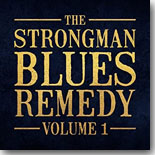 The
Strongman Blues Remedy is the latest in a
line of blues supergroups, conceived by
award-winning Canadian blues artist Steve
Strongman during the pandemic shutdown.
Strongman (vocals / guitar / bass / harmonica)
is joined by Steve Marriner (vocals/harmonica),
Dawn Tyler Watson (vocals), Harrison Kennedy
(vocals), Crystal Shawanda (vocals), Dave King
(drums), Alec Fraser (bass), and Jesse O’Brien
(keys). Volume 1 (Stony Plain Records)
features ten original tunes written by the band
and associates, offering a nice, upbeat remedy
for the recent hard times. The
Strongman Blues Remedy is the latest in a
line of blues supergroups, conceived by
award-winning Canadian blues artist Steve
Strongman during the pandemic shutdown.
Strongman (vocals / guitar / bass / harmonica)
is joined by Steve Marriner (vocals/harmonica),
Dawn Tyler Watson (vocals), Harrison Kennedy
(vocals), Crystal Shawanda (vocals), Dave King
(drums), Alec Fraser (bass), and Jesse O’Brien
(keys). Volume 1 (Stony Plain Records)
features ten original tunes written by the band
and associates, offering a nice, upbeat remedy
for the recent hard times.
Strongman handles vocals on five of the tracks
--- the slide-driven shuffle “Hard Luck,” the
slow blues “White Lightnin’,” the jaunty
acoustic “Gettin’ Stoned,” the mid-tempo rocker
“True To Me,” and the sturdy shuffle “Love Comin’
Down.” Marriner sits in on harmonica and vocals
on the swampy, Hill Country-flavored “Swansong,”
and Ms. Watson turns in a terrific vocal on the
feisty “Fine Young Man,” her brassy vocal
complemented perfectly by Strongman’s fretwork.
Former Chairman of the Board member Kennedy has
enjoyed a storied solo career in the blues world
since his days with Holland/Dozier/Holland. He
really stands out on his two vocal
contributions, the powerful soul blues “I Don’t
Miss You” and the lively shuffle “I Like To
Ride,” which was released as the album’s first
single. The talented Ms. Shawanda sings on the
blues rocker “Tell Me I’m Wrong,” featuring
searing guitar work from Strongman.
The
fact that The Strongman Blues Remedy’s first
album is entitled Volume 1 is a good
thing, because listeners will certainly want to
hear more after checking out this fine release.
So bring on Volume 2 asap!
--- Graham Clarke
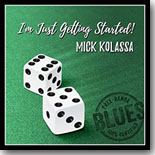 The
incredibly prolific Mick Kolassa has
released 11 albums since 2014, the latest titled
I’m Just Getting Started! (Endless Blues
Records), and it’s as high quality a set of his
“Free Range Blues” as the previous ten. For this
latest effort, Kolassa gives listeners a dozen
tracks, eight originals and four tasty covers
previously associated with Taj Mahal and Sleepy
John Estes, Chainsaw Dupont, John Hiatt, and
Pacific Gas & Electric. The
incredibly prolific Mick Kolassa has
released 11 albums since 2014, the latest titled
I’m Just Getting Started! (Endless Blues
Records), and it’s as high quality a set of his
“Free Range Blues” as the previous ten. For this
latest effort, Kolassa gives listeners a dozen
tracks, eight originals and four tasty covers
previously associated with Taj Mahal and Sleepy
John Estes, Chainsaw Dupont, John Hiatt, and
Pacific Gas & Electric.
Kolassa is backed by a fine set of musicians
that include Jef Jensen (guitar/producer),
Dexter Allen (bass/guitar), Rick Steff (keys),
John Blackmon (drums), Brandon Santini
(harmonica), Bill Ruffino (bass), Andrew McNeill
(drums), Marc Franklin (trumpet), Chris
Stephenson (keys), Kirk Smothers (sax), J. Remy
Williams (keys/backing vocals), and Julia Melah
and Donna Jones Nickleson (backing vocals).
The
title track opens the disc, and Kolassa delivers
it with such verve that you figure he might have
11 more albums in him down the road. The soul
blues ballad, “What Can I Do?,” features Allen
on guitar, the encouraging “Bigger Dreams”
implores listeners not to give up on theirs, and
“Alibis and Lies,” previously done by Chainsaw
Dupont has a jazzy feel, while the deliciously
funky take on “Leaving Trunk” is a nice showcase
for Kolassa and Santini.
“That Kind Of Man” is a smooth ballad with a
’70s R&B/soul vibe, thanks to Jensen guitar and
Steff’s work on the keyboard. “Are You Ready?”
was originally recorded by rock band Pacific Gas
and Electric in 1970. Kolassa’s version is taken
at a more leisurely, bluesy pace than the
original, but retains the gospel feel of its
predecessor. “Take Me Away” and “Trying Not To
Let The Darkness In” are both slow burners, the
former leaning toward soul and the latter toward
the blues side of the spectrum.
The
album wraps up with a funky blues cover of John
Hiatt’s “Real Man,” along with two more
originals --- the swampy blues track “Hard
Hearted Woman,” which warns of a female to be
avoided, and the humorous “How Much Can I Pay
You?,” about a lady who’s having too much fun
for all the other patrons at the club.
As
always on Mick Kolassa’s albums, 100% of the net
proceeds from I’m Just Getting Started!
go to the Blues Foundation, where it is split
between the Hart Fund and Generation Blues. I
encourage you to check out this excellent effort
and listen to some good music while helping to
support a worthy cause.
--- Graham Clarke
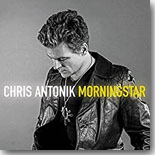 It’s been several
years, way too long, since we’ve heard anything
from Canadian blues rocker Chris Antonik.
During that gap in recordings, Antonik has dealt
with divorce, single parenthood, and sobriety,
along with the additional stress of living
through the pandemic. Antonik’s brand of blues
has always included traces of other genres, and
his newly-released fourth album, Morningstar
(Moondog Music/Second Half Records), reflects
those influences musically and the effects of
the past five years on his life lyrically. It’s been several
years, way too long, since we’ve heard anything
from Canadian blues rocker Chris Antonik.
During that gap in recordings, Antonik has dealt
with divorce, single parenthood, and sobriety,
along with the additional stress of living
through the pandemic. Antonik’s brand of blues
has always included traces of other genres, and
his newly-released fourth album, Morningstar
(Moondog Music/Second Half Records), reflects
those influences musically and the effects of
the past five years on his life lyrically.
Morningstar
was co-produced by Antonik and Juno
Award-winning producer Derek Downham, and
listening to it brought back memories of those
great atmospheric albums of the late ’80s that
were produced by Daniel Lanois. Like those
releases, this album covers a diverse set of
genres, all firmly rooted in the blues, and make
for powerful listening. Antonik also invited
several guests to participate in the release,
including Jarekus Singleton, Paul Deslauriers,
and Mike Mattison.
Singleton guests
on guitar for the opening track, “Waves Of
Stone,” a song about the end of a relationship
which blasts out of the starting gate like a
rocket with strong fretwork between the two
guitarists throughout the track. “Pilgrim” is a
bit more sedate in its approach, but not by much
with Antonik’s guitar still front and center and
a bit of a retro pop-rock feel with the addition
of synthesizers from Downham and the backing
vocals from Marlene O’Neill and Ciceal Levy.
The optimistic
“Back To The Good” features more searing guitar
work with horns, while “Trust In Me” is a
mid-tempo funky rocker about the frustration and
daily perils of single parenthood in a world
gone mad, punctuated by a frenzied soprano sax
break from Alison Young and guitar solo from
Antonik that fit perfectly within the song.
Young joins Antonik on vocals for the next tune,
the sweet country-flavored ballad “In Our Home.”
The next song is
a two-parter, “The Greatest of The Americans.”
Part One is a short instrumental with Antonik’s
guitar and Young on synthesizer, while Part Two
is a slow-building rocker that laments the
current U.S./Canada relationship via a failing
cross-country romance. The stirring “Learning To
Love You” is Antonik’s tribute to the classic
album Layla, complete with soaring rock
arrangement and Allman-esque guitar, and “How To
Be Alone” is a tasty slice of 80’s era pop
backed by electronic drums (and Antonik’s
sizzling Ernie Isley-like guitar solo) that
addresses the need to sometimes sit back alone
and find yourself.
“We’re Not
Alone,” with Deslauriers joining Antonik on
guitar, is a cool blues shuffle, reminding that
whatever one is going through, they’re not by
themselves. “The Promise of Airfields” is a
feel-good Latin-styled track that finds Antonik
celebrating his sobriety, and “Little Man” is a
poignant tune that he wrote for his son,
perfectly verbalizing what most fathers would
love to say to their children. Mattison guests
on harmony vocals for the funky “Be Here Now,”
before the album wraps up with the gorgeous
ballad, “Grace,” as Antonik reflects on what got
him through the hard times.
To these ears,
Morningstar stands as Chris Antonik’s best
work to date. Certainly it’s his most personal,
and his performance throughout lets us know that
he has lived all of these lyrics, and then some.
Not your typical blues-rock album, but
definitely one that any music lover will take
solace from, because we’ve all lived it in one
way or another.
--- Graham Clarke
 The
publicity notes for the new album by Chicago
blues singer Demetria Taylor proclaim
that she was born to sing the blues. Listen to
the dozen cuts on her latest, Doin' What I'm
Supposed To Do (Delmark Records), and you'll
certainly agree. She's got a fine voice and is
backed by a killer Chicago band led by guitarist
Mike Wheeler, and then throw in the bloodlines
that she possesses as the daughter of the late
Windy City blues legend Eddie Taylor. It's not a
voice with lots of power like one would have
heard from Koko Taylor, Big Time Sarah, or
others, past and present. Her vocals won't start
the paint peeling off the walls, but rather it's
more of a pleasant voice conveying the emotions
coming from her heart. The
publicity notes for the new album by Chicago
blues singer Demetria Taylor proclaim
that she was born to sing the blues. Listen to
the dozen cuts on her latest, Doin' What I'm
Supposed To Do (Delmark Records), and you'll
certainly agree. She's got a fine voice and is
backed by a killer Chicago band led by guitarist
Mike Wheeler, and then throw in the bloodlines
that she possesses as the daughter of the late
Windy City blues legend Eddie Taylor. It's not a
voice with lots of power like one would have
heard from Koko Taylor, Big Time Sarah, or
others, past and present. Her vocals won't start
the paint peeling off the walls, but rather it's
more of a pleasant voice conveying the emotions
coming from her heart.
Doin' What I'm Supposed To Do kicks off with
one from Eddie Taylor Sr.'s discography, with
"83 Highway" being a mid-tempo blues that gives
Wheeler plenty of space to preview the guitar
wizardry that we'll hear throughout the album.
Wheeler and bass player Larry Williams share
songwriting credits on the next number, the
up-tempo "Baby Be Good," with exceptional guitar
work throughout. That leads into one of the best
cuts, the up-tempo Memphis funky tune "Bad Girl
Day," with Taylor proclaiming that she's going
to be a bad girl tonight. Brian James gives it
that extra Memphis oomph with a very fine organ
solo.
Ms.
Taylor keeps it in the family with another
killer cut, "Blues Early This Morning," with
songwriting credit given to Vera Taylor, Eddie's
wife. Deitra Farr shares vocals on this up-tempo
blues shuffle, and Billy Flynn guests on guitar.
"Welfare Blues" is a funky high-velocity number
written by Eddie Taylor Jr., with James again
showcasing his keyboard skills. The funky sound
remains on the Wheeler original, "Doin' What I'm
Supposed To Do," as Taylor sings about all of
the blues legends who would stop by the Eddie
Taylor residence when she was young. Talk about
an early blues education!
"Done" is a soul/blues co-written by Wheeler and
Williams, with the former throwing in some
blues/rock guitar parts to give this tune plenty
of variety, before they slow the tempo on
another Wheeler/Williams piece, "I'm Gonna Tell
It."
James stars on both organ and piano on the
double-entendre number written by Ms. Demetria
herself, "Nursing My Kitty Cat." She lets us
know that she found a man to treat her right
when her regular lover doesn't come home. "Stay
Gone" seems like a continuation of the previous
song, as Taylor tells that man that he doesn't
need him to come home. She's doing quite fine
without him. That leads into an up-tempo Magic
Sam cover, You Belong To Me," as Taylor tells
one of her men how much she loves him.
Wrapping it up is a straight-ahead Chicago blues
shuffle co-written by Ms. Taylor and James,
"Young Gun Taylor," with Wheeler again tearing
it up on guitar.
Ms.
Taylor states emphatically that "it's her time,"
and I believe she's ready to take the next step
towards blues stardom. She's already a
significant member from the very prolific Taylor
family, and Doin' What I'm Supposed To Do
will hopefully get her career to that next
level.
--- Bill Mitchell
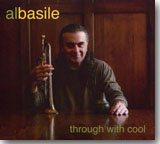 Veteran
New England area cornet player Al Basile
is back with Through With Cool (Sweetspot
Record), the follow-up to his very fine B's
Testimony from last year, just another of
more than a dozen recordings to his name. His
career goes back further than that, most notably
his stint with Roomful of Blues starting in
1973. Basile is also an acclaimed
poet/playwright, so it goes without saying that
he's capable of penning solid blues songs, which
he does on all 14 cuts on Through With Cool. Veteran
New England area cornet player Al Basile
is back with Through With Cool (Sweetspot
Record), the follow-up to his very fine B's
Testimony from last year, just another of
more than a dozen recordings to his name. His
career goes back further than that, most notably
his stint with Roomful of Blues starting in
1973. Basile is also an acclaimed
poet/playwright, so it goes without saying that
he's capable of penning solid blues songs, which
he does on all 14 cuts on Through With Cool.
Basile is one of the top horn players in the
blues business. Combining his playing with his
songwriting skills always makes for a solid set
of tunes. He isn't a great singer, with not a
lot of power in his voice, but he gets by. There
are times I think a song would be better with
more power in the vocals but it is what it is,
and his vocal work doesn't detract from a very
fine collection of blues.
Among the best cuts is "Hero," a song about what
Basile's woman wants him to be for her, but he
sings, "... But the costumes's loose and the
cape don't fit, I don't know how to fly, and
that's the truth of it ..." It's a jazzy
mid-tempo blues with strong guitar from Kid
Andersen. Another hot number is the up-tempo
"Two-Legged Mule," highlighted by the piano work
of Bruce Bears and another smokin' guitar solo
from Andersen. "Couldn't Live With It" has a
funky beat and, once again, gives Andersen a
chance to show off his prodigious guitar
talents.
The
snaky blues "Keep On Living" has Basile singing
about the woman who disappeared and never left a
clue, but his darker side tells that someday he
will be haunting her. This theme of women
disappearing on him seems to dominate Basile's
songwriting, because we hear the same kind of
lament on "Not Anyplace At All," one with a
Latin beat.
Basile goes deep into the blues on the final two
cuts, first the slow, plodding "We Lie On Your
Grave," with our star capturing the dark moment
with perhaps his best cornet solo. Closing the
album is a simple acoustic blues, "Through With
Cool," with just guitar and a steady drum beat
behind Basile as he realizes in his later years
that he just needs to stop trying to be cool.
Words of wisdom for all of us. But he gets dark
and mysterious by singing, "... I can't be cool
no more, the world's moved on without me, tell
me what am I living for? ..."
I'm
glad I have a physical copy of this album,
complete with a booklet giving all of the words
to the songs. As much as I've always appreciated
Basile for his cornet playing, I'm now realizing
that he's an even better songwriter. That
college degree in creative writing shows in his
songs. Please listen to the words carefully when
you're tuned in to the music of Al Basile.
--- Bill Mitchell
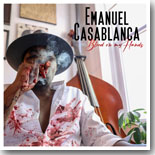 A
new name on the blues/rock scene is
Brooklyn-based singer, guitarist and songwriter
Emanuel Casablanca, with a new album,
Blood On My Hands (Kings County Blues),
containing 16 mostly original compositions. He's
a young artist with plenty of potential, a
searing guitar player who is equally comfortable
playing harder blues/rock while also able to sit
down and play an old blues classic. A
new name on the blues/rock scene is
Brooklyn-based singer, guitarist and songwriter
Emanuel Casablanca, with a new album,
Blood On My Hands (Kings County Blues),
containing 16 mostly original compositions. He's
a young artist with plenty of potential, a
searing guitar player who is equally comfortable
playing harder blues/rock while also able to sit
down and play an old blues classic.
There's stuff I like here, although parts of the
album are too hard for my tastes. I also believe
that this could have been a more concise
collection of tunes, as the final four cuts were
mostly unlistenable. But let's talk about what's
good here.
My
favorite cut is "Like A Pulse," which starts
with an acoustic guitar intro, followed by nice
piano from Ian Howells and a variety of
percussion sounds from Sanga of The Valley. Kat
Riggins joins in on co-vocals, with the two
pairing well together on a tribute to that
significant other, singing, "... you're my soul,
you're my rhythm, like a heartbeat, like a pulse
..." Touching lines. Riggins inspires
Casablanca to get more range and power in his
vocals, and he comes in later with strong
electric guitar licks. The number ends with more
tribal drumming. This is a really great song,
and a sign of the Casablanca's potential.
Equally strong is his cover of Robert
Nighthawk's "Anna Lee," a slow and very laidback
number that is so different from much of the
album. Casablanca's voice is well-suited for
this style of blues, and Jimmy Carpenter adds
solid sax playing. "Testify" is another good,
hard drivin' blues, kind of with a little John
Lee Hooker sound to it. "Bloodshot Eyes" (not
the better known song by this name) is a
mid-tempo blues shuffle, with Casablanca's voice
showing more range and his guitar playing much
more subdued on most of the album.
Among the more blues/rock cuts I prefer "In
Blood," with guest Paul Gilbert helping on
guitar. I'd like to hear a little more power in
Casablanca's vocals, especially when he sings to
his woman, "... I gave you my heart, but girl,
you took it in blood ..." Eric Gales shows up to
help with guitar duties on a mid-tempo heavy
blues shuffle, "Blood On My Hands." By now, you
may be noticing a fascination with the word
'blood,' as it shows up in the album title and
on seven cuts, not to mention the time he sings
about his love being like a pulse. Interesting.
There's more to Blood On My Hands than
I've covered more, but I'll leave those for you
to sample to see if you're into that style of
blues/rock. There's enough here to pique my
interest in this artist, and I hope to hear a
more concise, focused sound the next time
around.
--- Bill Mitchell
|